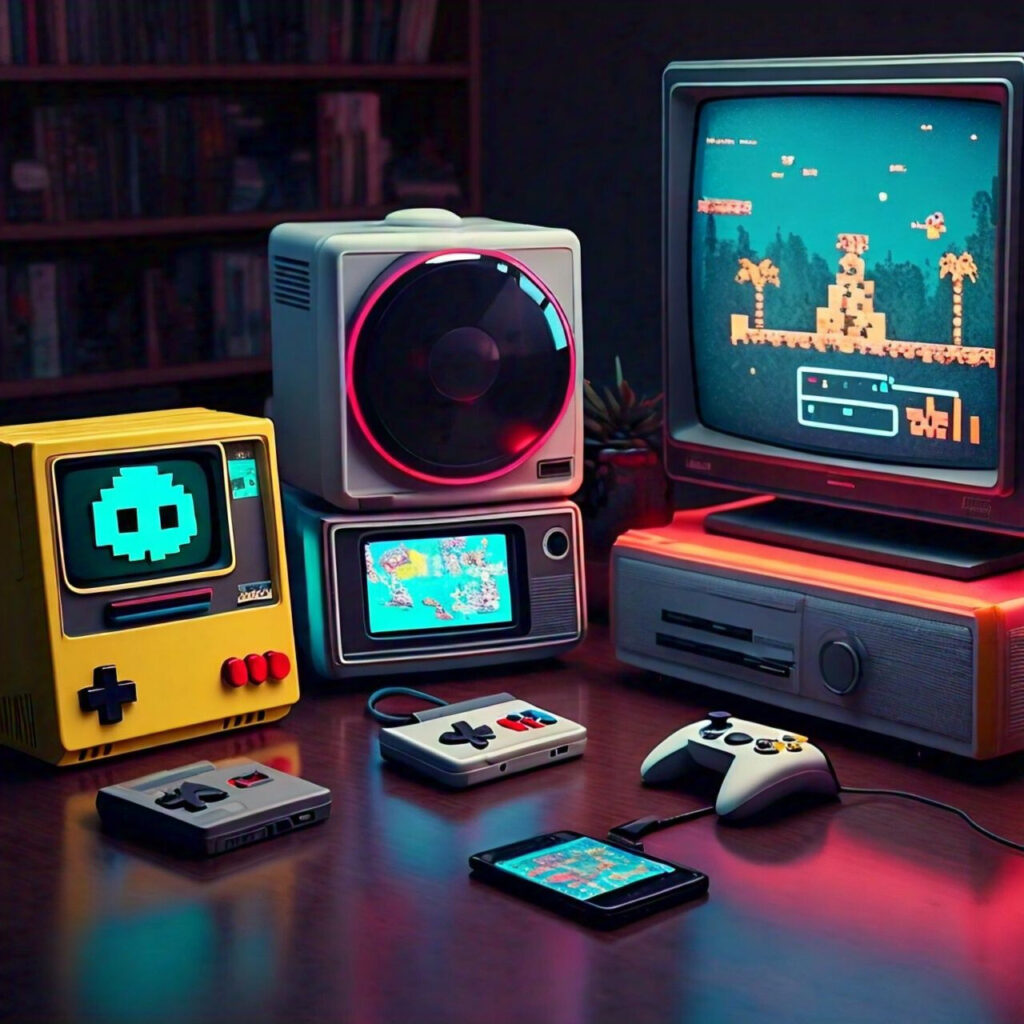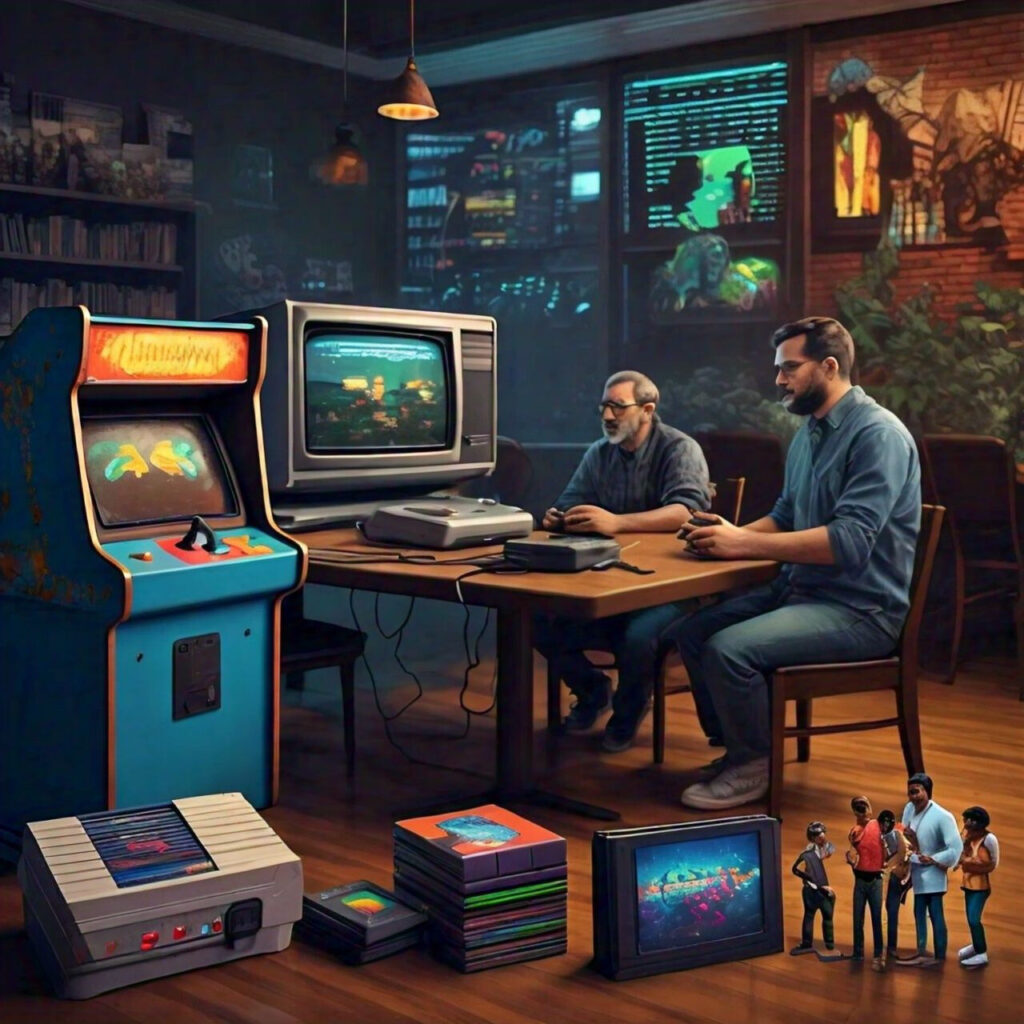Gaming Culture
From Pixels to Passion: An Examination of the Development of Video Game Culture
From the days of blurry graphics and bulky joysticks, gaming culture has advanced significantly. It’s now a worldwide phenomenon that includes both casual players and committed streamers in addition to competitive esports athletes. How did we get here, though? Together, we will explore the intriguing history of gaming culture.

Table of Contents
The Modest Origins: The Seeds of Ingenuity (1940s-1970s)
The earliest days of computing are where the foundations of gaming culture can be found. When experimenting with computer technologies in the 1940s and 1950s, scientists and engineers would make basic games like tic tac toe to test their devices. The foundation for future games was established by these early contests.
The invention of arcade games in the 1970s signaled a sea change. A more participatory and interesting gaming experience was provided by titles like Pong and Spacewar!, which drew players to specialized arcades. During this period, the Atari 2600 and other home consoles were introduced, giving players the opportunity to experience arcade games in the comfort of their own living rooms.
The 1980s and 1990s saw the emergence of genres and the rise of home consoles.
The home console market took off in the 1980s. Mario, Zelda, and Sonic the Hedgehog were among the popular franchises released by the Nintendo Entertainment System (NES) and Sega Genesis, which dominated the market. These games featured more intricate plots, graphics, and a variety of game genres, ranging from racing and platformers to side-scrolling shooters and role-playing games (RPGs).
Powerful 16-bit and 3D console versions were introduced in the 1990s, bringing in even more breakthroughs. Video games such as Super Mario 64 and GoldenEye 007 challenged the limits of visual realism and gameplay potential. First-person shooter (FPS), real-time strategy (RTS), and strategy games were developed during this period as a result of the popularity of personal computers (PCs) as a gaming platform.
The 2000s saw the emergence of online gaming and the growth of communities.
In the 2000s, gaming was revolutionized by the internet. Players could interact and compete with others all over the world by playing online multiplayer games like World of Warcraft and Counter-Strike. With forums, message boards, and early social media platforms acting as venues for gamers to exchange strategies, exchange stories, and create enduring connections, online communities grew rapidly.
During this time, competitive gaming also gained popularity as a spectator sport with the emergence of esports. Massive fan bases grew around games like League of Legends and StarCraft 2, where professional players competed in tournaments with substantial prize pools. Twitch and other streaming services allowed users to watch professional gamers compete and share their own gameplay experiences, which further contributed to the expansion of gaming culture.

The 2010s: The Age of Mobile Gaming and the Democratization of Play
The era of mobile gaming began with the proliferation of smartphones and tablets in the late 2000s. Games like Candy Crush Saga and Angry Birds attracted casual players and broke records for downloads and income, becoming cultural phenomena. Mobile games’ portability and ease of use make them available to a wider audience, democratizing gaming even more and extending the bounds of gaming culture.
The gaming culture of today is more dynamic and varied than it has ever been. Technologies like augmented reality (AR) and virtual reality (VR) offer even more immersive gaming experiences. Gamers have their own social media channels, and professional gamers may now make good money livestreaming.
The Gaming Culture of the Future: An Endless Sky of Opportunities
The gaming culture has a bright future ahead of it. Artificial intelligence (AI) breakthroughs that produce opponents with greater intelligence and difficulty are something we can anticipate. With cloud gaming services, users can access top-tier games on any device, doing away with the requirement for powerful consoles. Esports are anticipated to continue growing, with bigger prize pools and more public exposure for professional players.
There’s no denying that gaming culture has advanced significantly since its modest origins. It’s evidence of the inventiveness, creativity, and need for connection that drive humankind. It’s wonderful to think of the amazing new gaming horizons that lie ahead for players as technology advances.


